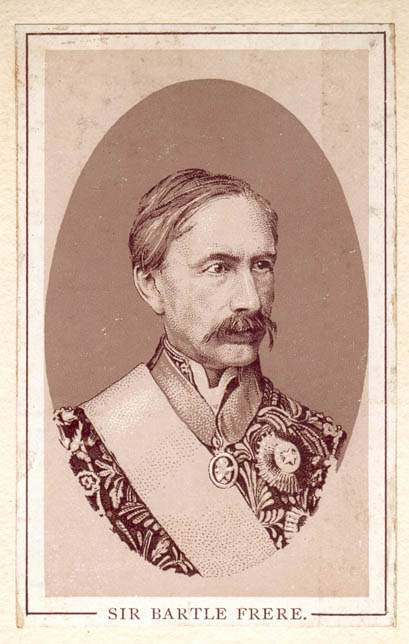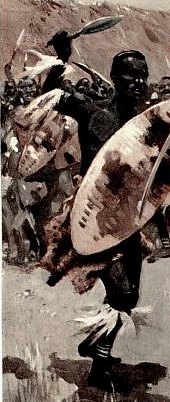|
African Military Systems (1800–1900)
African military systems (1800–1900) refers to the evolution of military systems on the African continent after 1800, with emphasis on the role of indigenous states and peoples within the African continent. Only major military systems or innovations and their development after 1800 are covered here. For events prior to 1800, see African military systems to 1800. Coverage of the late 19th/20th century and beyond is provided in African military systems after 1900. For an overall view of the military history of Africa by region, see Military History of Africa. See individual battles, empires and leaders for details on activities after 1800. African military systems and the 19th century Significant influences The beginning of the 19th century saw several factors that had significant bearing on the evolution of military systems. Such factors are referenced in standard histories on Africa that identify the 19th century as a period of intense transformation on the continent. Some of t ... [...More Info...] [...Related Items...] OR: [Wikipedia] [Google] [Baidu] |
Division (military)
A division is a large military unit or Formation (military), formation, usually consisting of between 6,000 and 25,000 soldiers. In most armies, a division is composed of several regiments or brigades; in turn, several divisions typically make up a corps. Historically, the division has been the default combined arms unit capable of independent Military tactics, operations. Smaller combined arms units, such as the American regimental combat team (RCT) during World War II, were used when conditions favored them. In recent times, modern Western militaries have begun adopting the smaller brigade combat team (similar to the RCT) as the default combined arms unit, with the division they belong to being less important. While the focus of this article is on army divisions, in naval usage "division (naval), division" has a completely different meaning, referring to either an administrative/functional sub-unit of a department (e.g., fire control division of the weapons department) aboar ... [...More Info...] [...Related Items...] OR: [Wikipedia] [Google] [Baidu] |
Anglo-Zulu War
The Anglo-Zulu War was fought in 1879 between the British Empire and the Zulu Kingdom. Following the passing of the British North America Act of 1867 forming a federation in Canada, Lord Carnarvon thought that a similar political effort, coupled with military campaigns, might succeed with the African Kingdoms, tribal areas and Boer republics in South Africa. In 1874, Sir Bartle Frere was sent to South Africa as High Commissioner for the British Empire to effect such plans. Among the obstacles were the armed independent states of the South African Republic and the Kingdom of Zululand.Knight (1992, 2002), p. 8. Frere, on his own initiative, sent a provocative ultimatum on 11 December 1878 to the Zulu king Cetshwayo and upon its rejection sent Lord Chelmsford to invade Zululand. The war is notable for several particularly bloody battles, including an opening victory of the Zulu at the Battle of Isandlwana, followed by the defence of Rorke's Drift by a small British force from ... [...More Info...] [...Related Items...] OR: [Wikipedia] [Google] [Baidu] |
Impi
is a Zulu word meaning war or combat and by association any body of men gathered for war, for example is a term denoting an army. were formed from regiments () from (large militarised homesteads). In English is often used to refer to a regiment, which is called an in or the army. Its beginnings lie far back in historic local warfare customs, when groups of armed men called battled. They were systematised radically by the king Shaka, who was then only the exiled illegitimate son of king Senzangakhona kaJama, but already showing much prowess as a general in the army () of Mthethwa king Dingiswayo in the Ndwandwe–Zulu War of 1817–1819. Genesis of the impi The Zulu impi is popularly identified with the ascent of Shaka, ruler of the relatively small Zulu tribe before its explosion across the landscape of southern Africa, but its earliest shape as an instrument of statecraft lies in the innovations of the Mthethwa chieftain Dingiswayo, according to some historians ( ... [...More Info...] [...Related Items...] OR: [Wikipedia] [Google] [Baidu] |
Shaka
Shaka kaSenzangakhona ( – 22 September 1828), also known as Shaka Zulu () and Sigidi kaSenzangakhona, was the king of the Zulu Kingdom from 1816 to 1828. One of the most influential monarchs of the Zulu, he ordered wide-reaching reforms that re-organized the military into a formidable force. King Shaka was born in the lunar month of ''uNtulikazi'' (July) in the year of 1787 near present-day Melmoth, KwaZulu-Natal Province, the son of the Zulu King Senzangakhona kaJama. Spurned as an illegitimate son, Shaka spent his childhood in his mother's settlements, where he was initiated into an '' ibutho lempi'' (fighting unit), serving as a warrior under Inkosi Dingiswayo. King Shaka further refined the ''ibutho'' military system and, with the Mthethwa Paramountcy's support over the next several years, forged alliances with his smaller neighbours to counter Ndwandwe raids from the north. The initial Zulu maneuvers were primarily defensive, as King Shaka preferred to apply pressure d ... [...More Info...] [...Related Items...] OR: [Wikipedia] [Google] [Baidu] |
Abd El-Kader
Abd al-Qadir or Abdulkadir ( ar, عبد القادر) is a male Muslim given name. It is formed from the Arabic words '' Abd'', ''al-'' and '' Qadir''. The name means "servant of the powerful", ''Al-Qādir'' being one of the names of God in the Qur'an, which give rise to the Muslim theophoric names. The letter ''a'' of the ''al-'' is unstressed, and can be transliterated by almost any vowel, often by ''u''. So the first part can appear as Abdel, Abdul or Abdal. The second part can be transliterated Qader, Kadir, Qadir, Kader, Gadir or in other ways, and the whole name subject to variable spacing and hyphenation. There is a related but much less common name, Abdul Qadeer ( ar, عبد القدیر), with a similar meaning. The two may become confused when transliterated, and a few of the names below may be instances of the latter name. Notable people with the name include: Men In sport Athletics * Abdelkader Zaddem (born 1944), Tunisian runner * Abdelkader El Mouaziz ... [...More Info...] [...Related Items...] OR: [Wikipedia] [Google] [Baidu] |
Firearm Malfunction
A firearm malfunction is the failure of a firearm to operate as intended for causes other than user error. Malfunctions range from temporary and relatively safe situations, such as a casing that did not eject, to potentially dangerous occurrences that may permanently damage the gun and cause injury or death. Improper handling of certain types of malfunctions can be very dangerous. Following gun safety rules can prevent firearm malfunctions, and limit the damage inflicted by them if they do occur. Many versions of safety rules exist, but all of them tend to lean toward universal principles. Proper cleaning and maintenance of a firearm play a big role in preventing malfunctions. Cartridge malfunctions Case head separation Case head separation occurs when the walls of the casing become thin or fatigued. Upon firing the round, the case separates into two pieces near the head. It is not uncommon with brass (or other casing types) that has been reloaded several times. Misfire A ... [...More Info...] [...Related Items...] OR: [Wikipedia] [Google] [Baidu] |
Charles Rathbone Low
Charles Rathbone Low (1837–1918) was a British officer of the Indian Navy and writer. Background The son of Major John Handcock Low of the East India Company and of the 39th Bengal Native Infantry, he was born in Dublin, in 1837. His father was killed in 1849 at Rajmahal. He was born in 1805, the youngest son of William John Low of Lowville, County Galway, and his wife the Hon. Sophie Hamilton, daughter of Richard Hamilton, 4th Viscount Boyne; he married Emily Revell in 1830, and she died in 1847. He married again, in 1848, to Clementina Clara Jane Hockley, daughter of Joseph Hockley. William Low, who served with the 67th Regiment of Foot, was the son of Nathaniel Low(e) of Lowville, who married Jane Handcock. She was the daughter of Robert Handcock, brother of Dean Richard Hancock, and his wife Jane Blackburne. Life Charles Rathbone Low was taken to India when a few months old, and attended school in Simla. He returned to live in England at the age of seven, and was orphan ... [...More Info...] [...Related Items...] OR: [Wikipedia] [Google] [Baidu] |



%2C_firearm.jpg)
